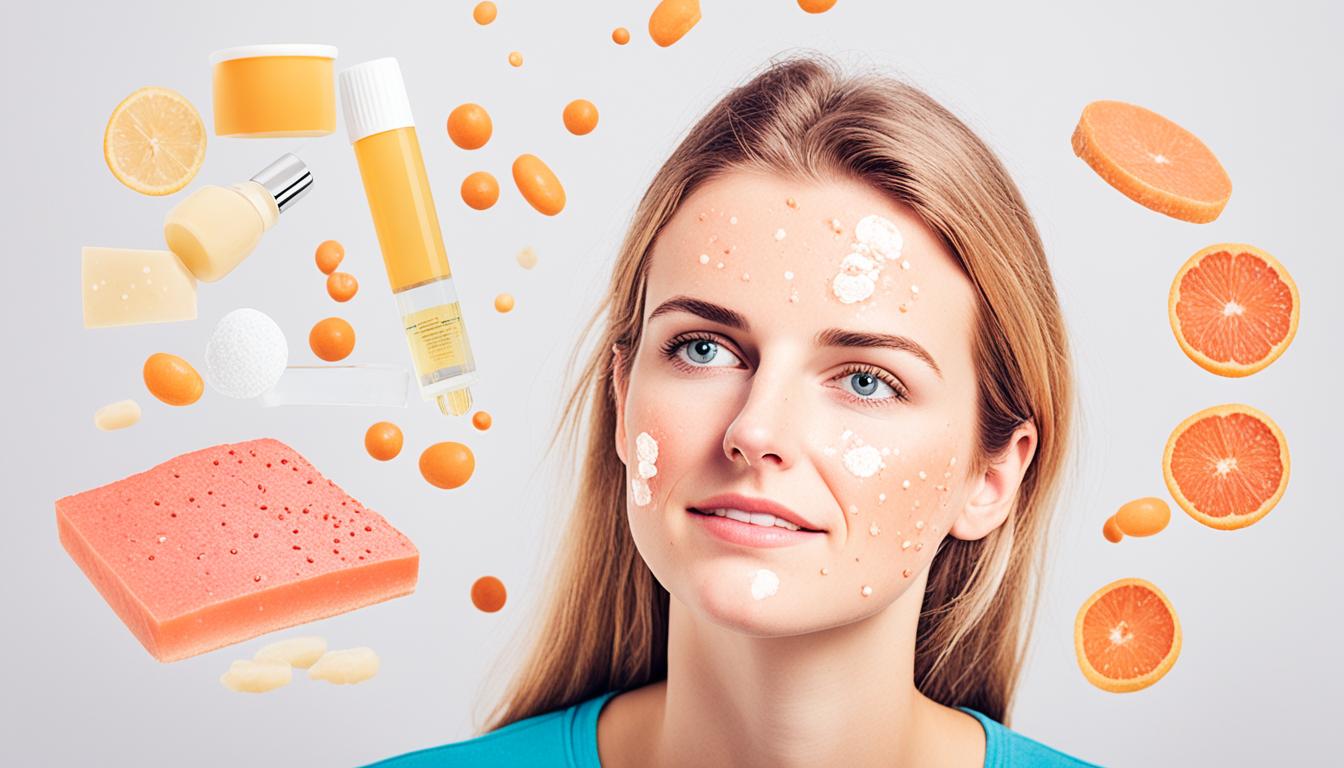Understanding Why Teens Get Acne Explained
Acne is a common skin problem that affects more than 85% of teenagers. It can be frustrating and distressing for teens who are already dealing with many other changes during this period of their lives. To effectively manage and treat acne, it is important to understand the causes and factors that contribute to its development in teenagers.
One of the primary causes of teenage acne is the hormonal changes that occur during puberty. These hormonal fluctuations can lead to overactive oil glands and the production of excess sebum, an oily substance that can clog pores and lead to the formation of acne. Additionally, genetics can also play a role, with individuals more likely to develop acne if their parents had it as well.
There are other factors that can contribute to teenage acne as well, such as the use of certain skincare products and cosmetics, hair dyes, and friction from clothing. It is important for teenagers to be aware of these factors and make necessary adjustments to their skincare routines and everyday habits to minimize the occurrence and severity of acne breakouts.
Key Takeaways:
- Teenage acne is a common skin problem that affects the majority of teenagers.
- It is primarily caused by hormonal changes during puberty, leading to overactive oil glands and the production of excess sebum.
- Genetics can also play a role in the development of acne, with individuals more likely to experience it if their parents had acne.
- Other factors that contribute to teenage acne include the use of certain skincare products and cosmetics, hair dyes, and friction from clothing.
- Understanding the causes and factors that contribute to teenage acne is essential for effective management and treatment.
How Hormonal Changes Contribute to Teenage Acne
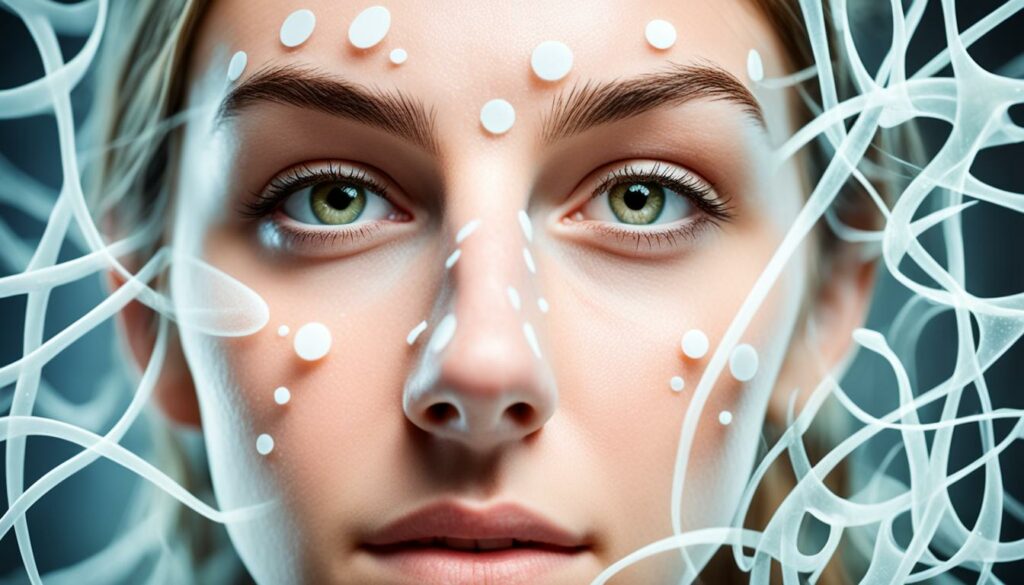
One of the key factors that contribute to teenage acne is hormonal changes that occur during puberty. These changes can have a significant impact on the skin, leading to the development of acne breakouts.
During puberty, there is a surge in sex hormones called androgens. These hormones cause the oil glands in the skin to become overactive, resulting in the production of excess sebum. The excess sebum combines with dead skin cells, leading to clogged pores and the formation of acne.
It’s important to note that hormonal changes related to the menstrual cycle and the use of birth control pills can also trigger acne in teenagers. This is due to the fluctuations in hormone levels that occur during these periods.
Stress can also worsen acne by increasing oil production in the skin. When teenagers experience stress, the body releases stress hormones like cortisol, which can stimulate the oil glands and contribute to the development of acne.
Understanding the Role of Hormones in Acne
Hormones play a crucial role in regulating the production of sebum and the overall health of the skin. Androgens, such as testosterone, stimulate the activity of the oil glands, leading to an increase in sebum production. When there is an excessive amount of sebum, it can mix with dead skin cells and bacteria, causing the pores to become clogged and acne to form.
| Hormone | Effect on Acne |
|---|---|
| Androgens | Stimulate oil gland activity and sebum production, leading to clogged pores and acne breakouts |
| Estrogen | Has an inhibitory effect on sebum production, which can reduce the likelihood of acne |
| Progesterone | Can stimulate the production of sebum and contribute to acne breakouts |
While hormonal changes are a natural part of adolescence, they can contribute to the development of acne in teenagers. Understanding the role of hormones and their impact on the skin can help teenagers and their parents take proactive steps to manage and treat acne effectively.
“Hormonal changes during puberty can have a profound effect on the skin. It’s important to understand the role of hormones in acne development and take steps to manage it effectively.”
The Role of Genetics in Teen Acne
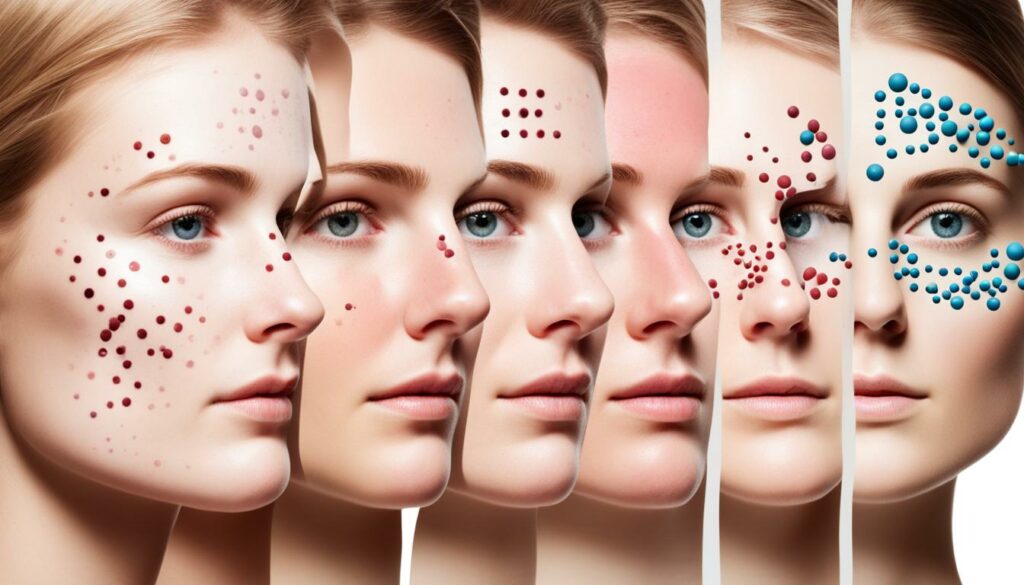
Genetics can play a significant role in the development of teenage acne. If both of your parents had acne, there is a higher likelihood that you will experience acne as well. While there isn’t one specific gene that causes acne, certain genetic factors contribute to an individual’s susceptibility to acne.
For instance, one parent may pass on a hormonal condition that makes you more prone to acne, while the other parent may pass on a genetic predisposition to a sensitive response to bacteria or other factors that can contribute to acne.
Understanding the genetic factors involved in teenage acne can provide insight into its causes and guide more effective treatment approaches. By addressing the underlying genetic susceptibility, healthcare providers can develop personalized strategies to manage and prevent acne breakouts.
In addition to genetic factors, it’s important to consider other causes of teenage acne, such as hormonal changes during puberty and external irritants like skincare products. By addressing the various factors contributing to acne, individuals can take a comprehensive approach to improve their skin’s health.
| Genetic Factors | Causes of Teenage Acne |
|---|---|
| Possessing a hormonal condition | Hormonal changes during puberty |
| A genetic predisposition to a sensitive response to bacteria | Use of certain skincare products |
| Friction from clothing |
Note: The table provides an overview of genetic factors that may contribute to teenage acne and some common causes of acne during adolescence.
It’s crucial to consult with a dermatologist for a personalized assessment of your acne. They can evaluate the genetic and environmental factors contributing to your acne and recommend appropriate treatment options, such as topical medications, oral medications, or lifestyle modifications.
Image: The image above illustrates the interplay between genetic factors and the causes of teenage acne.
Understanding Different Types of Acne
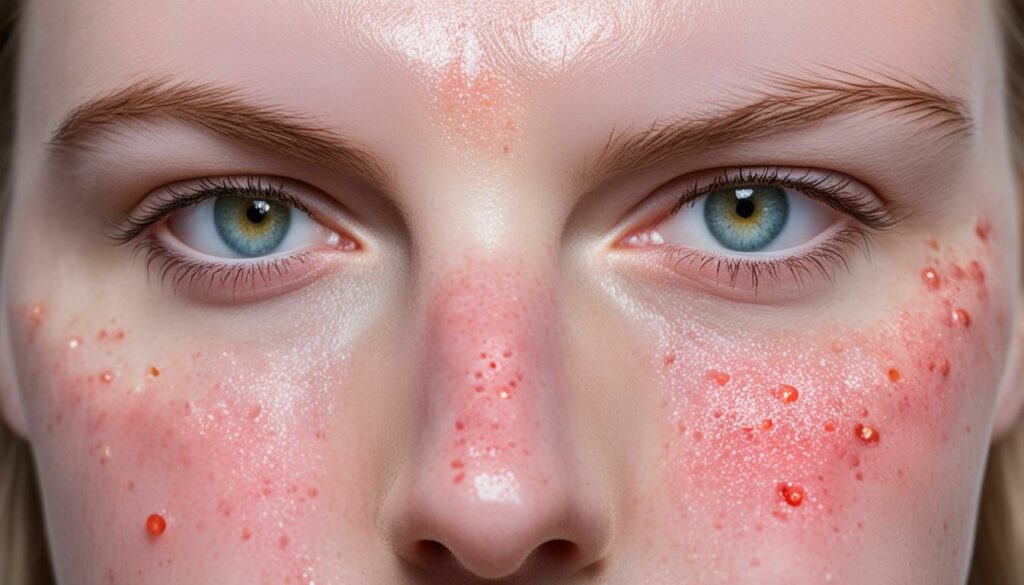
When it comes to acne, not all bumps are created equal. Understanding the different types of acne can help you identify and treat them effectively. Common types of acne bumps include:
- Whiteheads: These are pores that are clogged with oil, bacteria, and dead skin cells. They appear as small, white bumps on the skin and are closed at the surface.
- Blackheads: Unlike whiteheads, blackheads are open at the surface, causing the trapped oil, bacteria, and dead skin cells to oxidize and darken. They appear as small black or dark-colored bumps.
- Pimples: Pimples occur when the wall of a pore opens, allowing sebum, bacteria, and dead skin cells to enter and cause inflammation. They can appear as red, raised bumps with a white or yellow center.
- Nodules: Nodules are larger, painful bumps that form deep within the skin. They are often hard to the touch and can lead to scarring if not treated promptly.
Identifying the type of acne you have is important as it can impact the appropriate treatment approach. Now let’s take a closer look at each type of acne bump:
| Acne Type | Description |
|---|---|
| Whiteheads | Pores clogged with oil, bacteria, and dead skin cells, appearing as closed, white bumps on the surface of the skin. |
| Blackheads | Open pores that cause trapped substances to oxidize and darken, leading to small black or dark-colored bumps on the skin. |
| Pimples | Inflammation caused by the opening of a pore, allowing sebum, bacteria, and dead skin cells to enter. They appear as red, raised bumps with a white or yellow center. |
| Nodules | Larger, painful bumps that form deep within the skin. They are hard to the touch and can result in scarring if not treated promptly. |
Different Types of Acne
“Understanding the different types of acne allows for tailored treatment approaches, effectively addressing specific concerns and achieving better skin health.” – Dr. Sarah Johnson, Dermatologist
With this knowledge about the different types of acne, you can now identify the bumps on your skin accurately and make informed decisions about your skincare routine and treatment options. Remember, consulting a dermatologist is crucial for personalized guidance and effective acne management.
Factors That Can Aggravate Teenage Acne
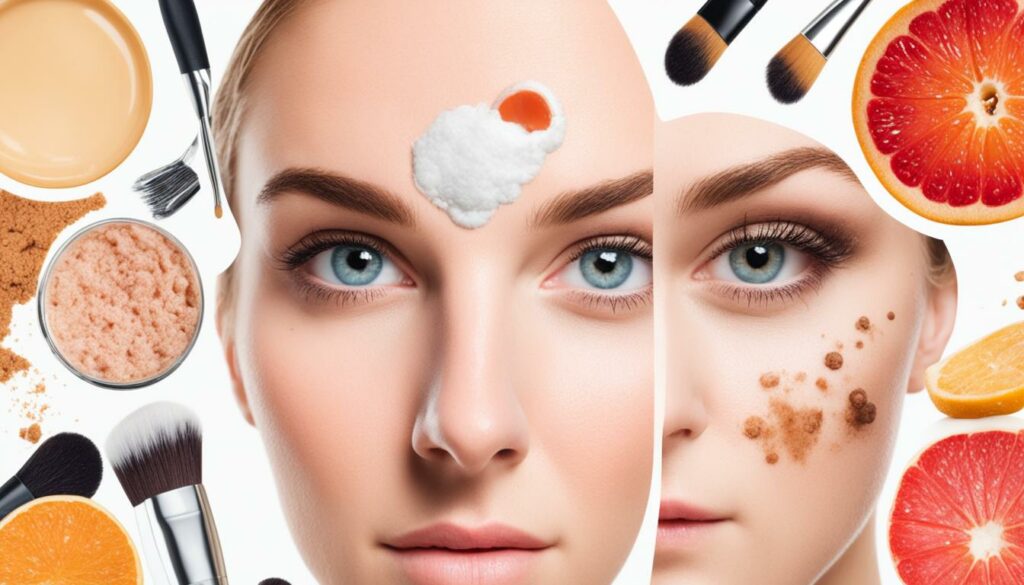
While hormonal changes are a major cause of teenage acne, several other factors can worsen the condition and increase the frequency of breakouts. It’s important to be aware of these factors in order to effectively manage and prevent acne in teenagers.
Dietary Factors
What you eat can have a significant impact on your skin. Certain dietary factors, such as a high intake of sugars and simple carbohydrates, have been linked to increased acne breakouts in teenagers. These types of foods can cause spikes in blood sugar levels, leading to inflammation and increased oil production in the skin, both of which contribute to acne formation.
Avoiding sugary drinks, processed snacks, and fast food can help reduce the frequency and severity of acne breakouts. Instead, opt for a balanced diet rich in fruits, vegetables, lean proteins, and whole grains. Drinking plenty of water and incorporating foods that are high in antioxidants can also help promote healthier skin.
Skincare Products and Cosmetics
The products you use on your skin can either help or worsen acne. Skincare products and cosmetics that are comedogenic or oil-based can clog the pores and lead to more frequent breakouts. It’s important to choose non-comedogenic and oil-free products that won’t contribute to pore blockage.
When selecting skincare products, look for ones that are specifically formulated for acne-prone skin and contain ingredients such as salicylic acid or benzoyl peroxide. These ingredients help to unclog pores, reduce oil production, and fight acne-causing bacteria.
It’s also important to cleanse your face gently and avoid excessive scrubbing, as this can irritate the skin and cause further inflammation.
Friction and Pressure
Friction and pressure can worsen acne, especially in areas where there is constant contact with objects such as headbands, helmets, or backpack straps. The constant rubbing can irritate the skin and lead to more frequent breakouts in those areas.
While it may not be possible to completely avoid these items, taking steps to minimize friction and pressure can help reduce acne aggravation. For example, wearing a soft, non-irritating headband or using protective padding on helmet straps can help prevent excessive rubbing on the skin.
Stress
Stress doesn’t directly cause acne, but it can exacerbate existing breakouts. When you’re stressed, your body releases stress hormones like cortisol, which can increase oil production and inflammation in the skin. This can lead to more frequent and severe acne breakouts.
Finding healthy ways to manage stress, such as practicing relaxation techniques or engaging in physical activities, can help reduce its impact on acne. Getting enough sleep, maintaining a balanced schedule, and seeking support from friends and family can also contribute to overall stress reduction.
In summary, several factors can aggravate teenage acne, including dietary factors, the use of skincare products and cosmetics that are comedogenic or oil-based, friction and pressure from certain items, and stress. By being mindful of these factors and making necessary lifestyle adjustments, teenagers can effectively manage and prevent acne breakouts, promoting healthier skin and boosting their self-confidence.
Treating Teenage Acne
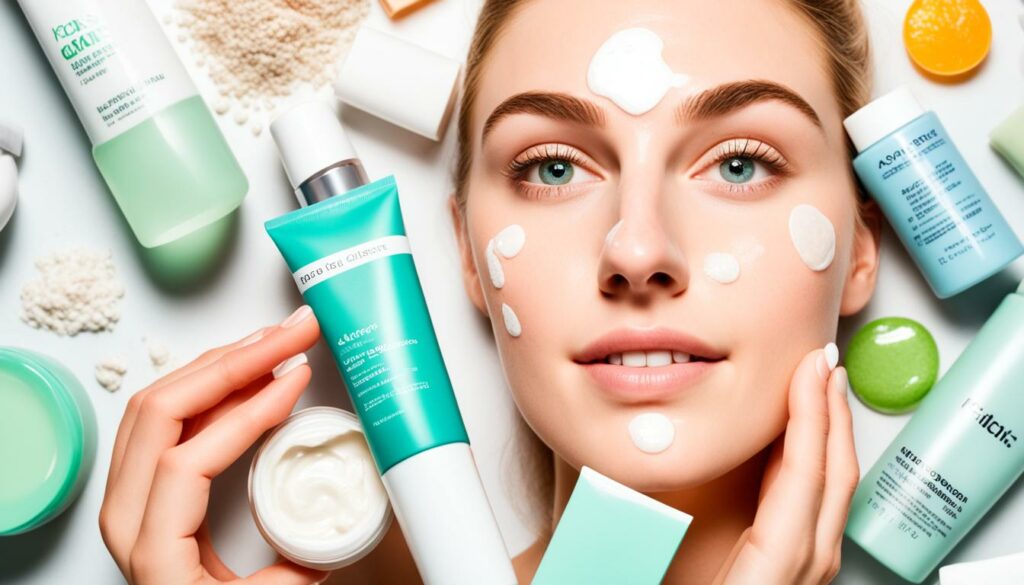
Treating acne in adolescence requires a comprehensive approach to effectively manage breakouts and promote clear, healthy skin. Establishing a good skincare routine is essential in combating acne. This includes cleansing the skin with a gentle cleanser twice a day to remove excess oil, dirt, and impurities. Use a non-comedogenic moisturizer to keep the skin hydrated without clogging the pores. Additionally, it is crucial to apply sunscreen daily to protect against harmful UV rays that can worsen acne and cause hyperpigmentation.
Remember the acronym CTM: Cleanse, Tone, Moisturize. These three steps are the cornerstone of a good skincare routine for teens with acne-prone skin.
Over-the-counter topical treatments can be effective in managing mild to moderate acne. Look for products that contain active ingredients like benzoyl peroxide or salicylic acid. Benzoyl peroxide unclogs pores, reduces inflammation, and kills acne-causing bacteria, while salicylic acid helps exfoliate the skin and prevent pore blockages. It is important to use these products as directed and give them time to work, as results may not be immediate.
Prescription Treatments for Severe Acne
If acne is severe or persistent, it may be necessary to consult a dermatologist for personalized treatment recommendations. In more severe cases, dermatologists may prescribe topical retinoids, antibiotics, or hormonal treatments. Topical retinoids work by unclogging pores, reducing inflammation, and promoting skin cell turnover. Antibiotics can help control bacteria on the skin and reduce inflammation. Hormonal treatments, such as birth control pills or spironolactone, may be prescribed for acne related to hormonal imbalances.
During a dermatologist consultation, they will evaluate the severity of the acne and develop a tailored treatment plan. Depending on your specific needs, they may recommend a combination of topical and oral medications to effectively manage acne and prevent future breakouts. It’s important to follow the dermatologist’s instructions and be patient with the treatment process, as it may take time to see significant improvement.
| Treatment | Description |
|---|---|
| Benzoyl Peroxide | Topical medication that kills acne-causing bacteria, reduces inflammation, and helps unclog pores. |
| Salicylic Acid | Topical medication that exfoliates the skin, removes dead skin cells, and prevents pore blockages. |
| Topical Retinoids | Prescription-strength creams or gels that unclog pores, reduce inflammation, and promote skin cell turnover. |
| Antibiotics | Prescription medications, either topical or oral, that control bacteria and reduce inflammation. |
| Hormonal Treatments | Prescribed for hormonal acne, such as birth control pills or spironolactone, to regulate hormone levels and minimize breakouts. |
Consulting a dermatologist is crucial for effective acne treatment, especially for severe or persistent cases. They can provide expert guidance, monitor progress, and make necessary adjustments to the treatment plan to achieve optimal results.
- Establish a daily skincare routine with gentle cleansers and non-comedogenic moisturizers.
- Use over-the-counter topical treatments with benzoyl peroxide or salicylic acid.
- Consult a dermatologist for personalized treatment recommendations.
- Follow the prescribed treatment plan, which may include topical retinoids, antibiotics, or hormonal treatments.
Managing Acne Breakouts

Along with proper treatment, there are steps you can take to help manage acne breakouts. By following these skincare tips and making healthy lifestyle choices, you can prevent acne in teenagers and improve the overall health of your skin.
Skincare Tips for Adolescent Acne:
- Avoid over-washing or using harsh scrubs: Over-washing the face can strip away natural oils and irritate the skin, leading to more breakouts. Instead, wash your face twice a day with a gentle cleanser specifically formulated for acne-prone skin.
- Use oil-free or non-comedogenic products: Look for skincare products, moisturizers, and cosmetics that are labeled “oil-free” or “non-comedogenic”. These products are less likely to clog pores and worsen acne.
- Avoid squeezing or picking at blemishes: It may be tempting to pop pimples or squeeze blackheads, but this can lead to inflammation, infection, and scarring. Instead, try spot treatments containing ingredients like benzoyl peroxide or salicylic acid.
- Avoid excessive sun exposure: While sun exposure may temporarily improve acne, it can lead to long-term damage and worsen acne breakouts. Protect your skin by wearing a broad-spectrum sunscreen with an SPF of 30 or higher.
Additionally, making healthy lifestyle choices can contribute to healthier skin and prevent acne breakouts. Maintaining a balanced diet, getting enough sleep, and managing stress levels can help support overall skin health.
Remember, managing acne breakouts is a combination of proper treatment, consistent skincare, and lifestyle modifications. By following these skincare tips and implementing healthy habits, you can prevent acne breakouts, improve your skin’s condition, and boost your self-confidence.
Acne in Transgender and Nonbinary Teens
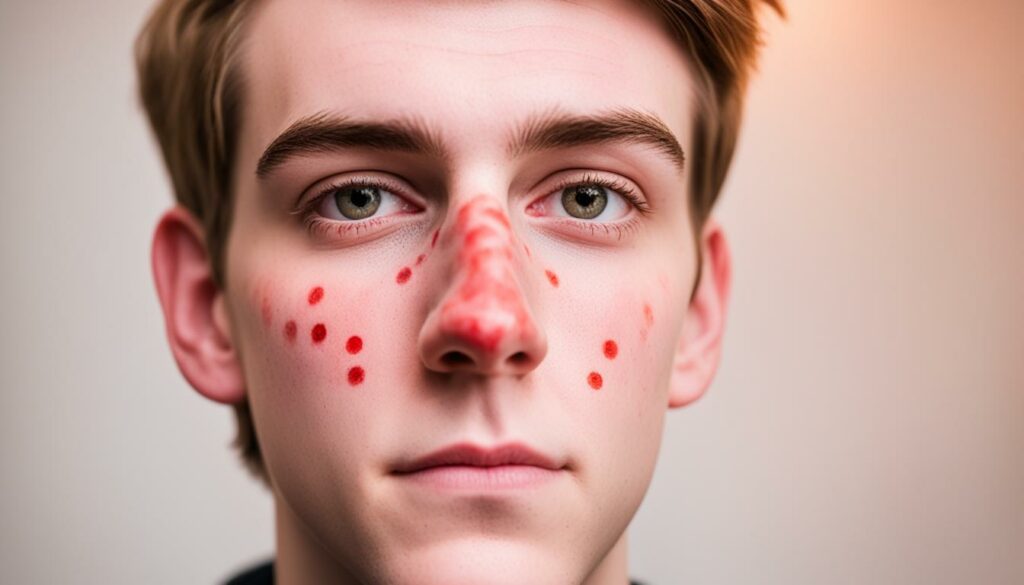
Transgender and nonbinary teens who undergo hormone therapy, such as taking testosterone, may experience acne as a side effect. Hormone therapy can increase sebum production, leading to the development of acne. It is important for these teens to work with a healthcare provider to develop an acne treatment plan that takes into account their unique circumstances. This may involve a combination of topical or oral medications, as well as adjustments to hormone therapy to minimize acne severity.
Acne can have a significant impact on the self-esteem and mental well-being of transgender and nonbinary teens. It is essential to provide support and understanding, reassuring them that acne is a common and treatable condition. In addition to medical interventions, promoting self-care and a positive body image can help alleviate the emotional challenges associated with acne.
Let’s take a closer look at how hormone therapy can contribute to acne development in transgender and nonbinary teens:
“Hormone therapy can increase sebum production, leading to the development of acne.”
Understanding Hormone Therapy and Acne
Hormone therapy is often used by transgender and nonbinary individuals to align their physical characteristics with their gender identity. The use of testosterone, for example, can lead to changes such as increased muscle mass, deeper voice, and the development of facial and body hair. However, hormone therapy can also affect the skin, causing an increase in sebum production.
Sebum is an oily substance produced by the sebaceous glands in the skin. Its primary function is to lubricate and protect the skin. However, an excess of sebum can lead to clogged pores and the development of acne. When hormone therapy triggers increased sebum production, the risk of acne breakouts also rises.
Treating Acne in Transgender and Nonbinary Teens
Managing acne in transgender and nonbinary teens requires a comprehensive approach that considers their unique hormonal profiles and treatment goals. Collaboration with a knowledgeable healthcare provider, such as a dermatologist or endocrinologist, is crucial in developing an effective treatment plan.
The treatment options for acne in transgender and nonbinary teens undergoing hormone therapy may include:
- Topical medications: Prescription-strength creams, gels, or lotions that can help control sebum production and reduce inflammation.
- Oral medications: In some cases, oral antibiotics or other systemic medications may be recommended to address more severe acne.
- Hormone therapy adjustments: Modifying the dosage or type of hormone therapy can help manage acne by reducing the impact on sebum production.
It is important to note that treatment plans should be personalized and tailored to each individual’s specific needs and preferences. Regular follow-up appointments with healthcare providers are necessary to monitor progress and make any necessary adjustments to the treatment plan.
| Treatment Options | Description |
|---|---|
| Topical Medications | Prescription creams, gels, or lotions that are applied directly to the skin to control sebum production and reduce inflammation. |
| Oral Medications | Systemic medications, such as antibiotics, that are taken orally to address more severe cases of acne. |
| Hormone Therapy Adjustments | Modifying the dosage or type of hormone therapy to minimize its impact on sebum production and acne development. |
Incorporating good skincare practices, such as gentle cleansing, avoiding harsh scrubs, and using non-comedogenic products, can also help manage acne in transgender and nonbinary teens. Additionally, maintaining a healthy lifestyle, including a balanced diet, regular exercise, and stress management, can contribute to overall skin health.
By addressing acne concerns in transgender and nonbinary teens, healthcare providers can play a crucial role in supporting their physical and emotional well-being. Together, we can ensure these individuals feel confident and comfortable in their skin, embracing their true identities.
The Emotional Impact of Teenage Acne
Teenage acne can have a significant impact on a teenager’s self-esteem and overall well-being. Acne breakouts can contribute to feelings of self-consciousness, embarrassment, and social withdrawal. It’s important for parents, educators, and healthcare professionals to provide support and understanding to teenagers struggling with acne.
Emphasizing that acne is a common and treatable condition can help alleviate some of the emotional distress associated with it. Educating teenagers about the underlying causes of acne and the available treatment options can empower them to take control of their skincare journey and boost their self-confidence.
Encouraging healthy coping mechanisms is essential for teenagers dealing with acne. Practicing self-care, engaging in activities they enjoy, and cultivating a positive body image can help teenagers navigate the emotional challenges associated with acne. Seeking professional help, such as talking to a dermatologist or therapist, can provide additional guidance and support.
“The emotional impact of teenage acne can be significant, but it’s important to remember that nobody is defined by their skin. Supporting teenagers through open communication, empathy, and providing them with effective solutions can help improve their mental well-being.”
By addressing the emotional impact of acne and promoting a positive mindset, teenagers can develop resilience and a healthier relationship with their skin. It’s crucial to emphasize that acne does not diminish their worth or beauty and that self-acceptance is key.
Key Points to Address:
- Teenage acne can negatively affect self-esteem and well-being.
- Support and understanding are essential for teenagers struggling with acne.
- Education about acne and available treatments can empower teenagers.
- Healthy coping mechanisms, such as self-care and seeking professional help, can alleviate emotional distress.
- Emphasize that acne does not define a teenager’s worth or beauty.
In the next section, we will discuss when it is necessary to seek medical treatment for teenage acne and the available options.
When to Seek Medical Treatment for Teenage Acne
In most cases, teenage acne can be managed with over-the-counter treatments and good skincare practices. However, if acne persists or worsens despite these efforts, it may be necessary to seek medical treatment from a dermatologist. A dermatologist can assess the severity of the acne and recommend appropriate prescription medications, such as topical retinoids, antibiotics, or hormonal treatments. It is important to seek medical treatment early to prevent potential scarring and long-term skin damage.
If you experience any of the following, it may be time to see a dermatologist:
- Severe acne that covers a large area of the face or body
- Acne that is causing physical discomfort or pain
- Acne that is leaving behind scars or dark spots
- Acne that is not improving with over-the-counter treatments
- Acne that is causing emotional distress or affecting your self-esteem
Seeing a dermatologist can provide you with a personalized treatment plan tailored to your specific needs. They can offer professional guidance, prescribe stronger medications if necessary, and monitor your progress over time. Remember, seeking medical treatment for acne is not a sign of failure; it is a proactive step towards achieving clearer, healthier skin.
Acne Prevention and Long-Term Management
While treating existing acne is important, it is equally essential to focus on prevention and long-term management. By incorporating certain practices into your daily routine, you can reduce the likelihood of acne breakouts and maintain clear, healthy skin in the long run.
Maintain a Consistent Skincare Routine
Establishing a regular skincare routine is crucial in preventing acne breakouts. Cleanse your face twice a day using a gentle cleanser to remove dirt, excess oil, and impurities. Be sure to avoid over-washing, as it can strip the skin of its natural oils and cause irritation.
After cleansing, apply a non-comedogenic moisturizer to keep the skin hydrated without clogging the pores. Additionally, incorporate sunscreen into your daily routine to protect your skin from harmful UV rays.
Avoid Potential Acne Triggers
Certain skincare products and dietary factors can contribute to acne breakouts. Avoid using heavy, oil-based cosmetics and skincare products that can clog the pores and exacerbate acne. Opt for non-comedogenic or oil-free alternatives instead.
In terms of diet, limit your consumption of sugary foods and beverages, as well as simple carbohydrates, as they have been linked to increased acne breakouts. Instead, focus on a balanced diet rich in fruits, vegetables, whole grains, and lean proteins to nourish your skin from within.
Manage Stress Levels
Stress has been known to worsen acne breakouts. Practice stress management techniques such as regular exercise, meditation, deep breathing, or engaging in activities that you enjoy. Establishing a healthy work-life balance and getting enough sleep can also help reduce stress levels.
Regular Follow-Up Visits with a Dermatologist
Visiting a dermatologist regularly is key to monitoring your progress and making any necessary adjustments to your treatment plan. Your dermatologist can offer personalized recommendations and treatments to prevent acne recurrence and maintain clear skin in the long term.
By implementing these preventive measures and taking a proactive approach to long-term acne management, you can minimize the occurrence of breakouts and enjoy healthier, clearer skin.
Conclusion
Teenage acne is a common skin condition that affects many teenagers, both physically and emotionally. However, there are effective ways to manage and prevent acne breakouts in adolescents. By understanding the causes of teenage acne, implementing a suitable skincare routine, seeking professional help when needed, and practicing self-care, teenagers can regain their confidence and feel comfortable in their own skin.
One of the key steps in managing teenage acne is understanding its underlying causes. Hormonal changes during puberty play a significant role, leading to overactive oil glands and excess sebum production. Genetic factors can also contribute to acne susceptibility. By addressing these root causes, it becomes easier to develop a personalized treatment plan that works for each individual.
Managing adolescent acne requires consistent skincare practices and making necessary lifestyle adjustments. A good skincare routine involves gentle cleansing, using non-comedogenic products, and protecting the skin from the sun. Avoiding acne triggers, such as certain skincare products and dietary factors, can also help prevent breakouts. Additionally, seeking medical treatment from a dermatologist when over-the-counter remedies are not effective is crucial.
It is important to remember that acne is a treatable condition. With the right understanding, support, and appropriate management of teenage acne, teenagers can have clearer and healthier skin, enhancing their overall well-being and self-esteem.
FAQ
Why do teenagers get acne?
Teenagers get acne due to hormonal changes during puberty, which lead to overactive oil glands and the production of excess sebum. Other factors that can contribute to teenage acne include genetics, certain skincare products, cosmetics, hair dyes, and friction from clothing.
How do hormonal changes contribute to teenage acne?
Hormonal changes during puberty, such as an increase in androgens, cause the oil glands in the skin to become overactive, leading to the production of excess sebum. This excess sebum, along with dead skin cells, can clog the pores and result in acne breakouts.
What is the role of genetics in teen acne?
While there isn’t one specific gene that causes acne, genetics can play a role in the development of teenage acne. If your parents had acne, you are more likely to experience it too. Certain genetic factors may contribute to an individual’s susceptibility to acne, such as a hormonal condition or a genetic predisposition to a sensitive response to bacteria or other acne-causing factors.
What are the different types of acne?
There are various types of acne bumps that can appear on the skin, including whiteheads, blackheads, pimples, and nodules. Whiteheads are pores clogged with oil and skin cells, closed at the surface. Blackheads are clogged and open pores, causing the surface to darken. Pimples occur when the walls of pores open, allowing sebum, bacteria, and dead skin cells to enter and cause inflammation. Nodules are larger, painful bumps that form deep within the skin and can lead to scarring.
What factors can aggravate teenage acne?
Factors that can worsen teenage acne include hormonal changes, stress, certain dietary factors (such as a high intake of sugars and simple carbohydrates), using comedogenic or oil-based skincare products and cosmetics, as well as friction from items like headbands and helmets.
How can teenage acne be treated?
Treating teenage acne involves a multi-faceted approach. A good skincare routine is essential, including using a gentle cleanser, non-comedogenic products, and applying moisturizer and sunscreen. Over-the-counter topical treatments with ingredients like benzoyl peroxide and salicylic acid can help unclog pores and reduce inflammation. In more severe cases, dermatologists may prescribe topical retinoids, antibiotics, or hormonal treatments.
How can acne breakouts be managed?
To manage acne breakouts, it is important to avoid over-washing or using harsh scrubs, use oil-free or non-comedogenic products, and avoid squeezing or picking at blemishes. It is also important to protect the skin from excessive sun exposure with broad-spectrum SPF. Making healthy lifestyle choices, such as maintaining a balanced diet, getting enough sleep, and managing stress, can also contribute to healthier skin.
How does hormone therapy affect acne in transgender and nonbinary teens?
Transgender and nonbinary teens who undergo hormone therapy, such as taking testosterone, may experience acne as a side effect. Hormone therapy can increase sebum production and lead to the development of acne. It is important for these teens to work with a healthcare provider to develop an acne treatment plan that considers their unique circumstances.
What is the emotional impact of teenage acne?
Teenage acne can have a significant impact on a teenager’s self-esteem and overall well-being. Acne breakouts can contribute to feelings of self-consciousness, embarrassment, and social withdrawal. It is important to provide support and understanding to teenagers struggling with acne, emphasizing that it is a common and treatable condition.
When should medical treatment be sought for teenage acne?
If acne persists or worsens despite over-the-counter treatments and good skincare practices, it may be necessary to seek medical treatment from a dermatologist. A dermatologist can assess the severity of the acne and recommend appropriate prescription medications, such as topical retinoids, antibiotics, or hormonal treatments.
How can acne be prevented and managed in the long term?
Along with treating existing acne, it is important to focus on prevention and long-term management. This includes maintaining a consistent skincare routine, avoiding potential acne triggers, and managing stress levels. Regular follow-up visits with a dermatologist can help monitor progress and make necessary adjustments to the treatment plan.
Conclusion
Teenage acne is a common skin condition that can have emotional and physical impacts. With proper treatment and lifestyle adjustments, acne can be effectively managed. Understanding the causes of teenage acne, following an appropriate skincare routine, seeking medical treatment when necessary, and practicing self-care are key elements in managing and preventing acne breakouts in teenagers.

